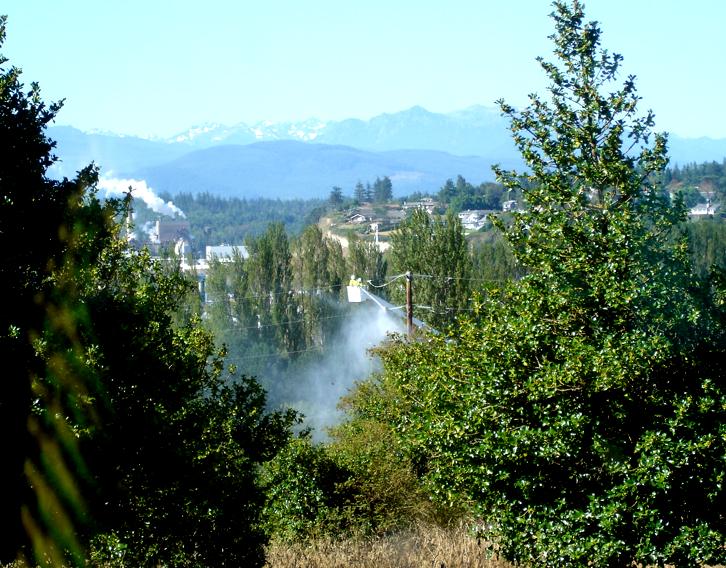Pressure washing insulators?
 Phil Pilgrim (PhiPi)
Posts: 23,514
Phil Pilgrim (PhiPi)
Posts: 23,514
This is a new one for me. I looked out my front window, where I can see the high-tension lines that service the town I live in, and a crew from the power company was pressure washing the insulators on one of the power poles:

Now this is a bit of maintenance I've never seen before or even imagined necessary -- despite the number of seagulls that abound around here. And what a maintenance nightmare if they have to do that to every pole! Moreover, it seems as if it would be a rather hazardous undertaking for the crew. After all, the water column in the hose is grounded, and water (unless it's deionized or distilled) does conduct electircity.
'Anyone here familiar with electric utility practices who can shed some light?
Thanks,
-Phil
Now this is a bit of maintenance I've never seen before or even imagined necessary -- despite the number of seagulls that abound around here. And what a maintenance nightmare if they have to do that to every pole! Moreover, it seems as if it would be a rather hazardous undertaking for the crew. After all, the water column in the hose is grounded, and water (unless it's deionized or distilled) does conduct electircity.
'Anyone here familiar with electric utility practices who can shed some light?
Thanks,
-Phil



Comments
Second, I have no idea why they are doing this, other than possibly to make sure that the view you have stays pleasing, with nice white insulators.
Third, with that view, how do you get any work done?
John R.
There are some nasty and disturbing graphic images online of a poor chap who was killed trying to steal copper wire with a hacksaw. The safety rubber gloves he wore failed to protect him from the high-tension line. I won't post a link, but the curious and strong-stomached can google "thou shalt not steal copper wire".
-Phil
they arc all the time from salt on the insulators
they are 3
We do it from choppers over here for the more rural stuff. The lines are down while it's being done and generally they earth them at the nearest sub (HV lines can have large residual static charges. They make great capacitors.)
I remember about 16 years ago we had a huge incident where they had not been washing the insulators regularly enough (cost cutting) and on one particularly humid day the number of flashovers and the ensuing fire risk (wooden poles 'n all that) made them literally shut down the entire grid (and I mean the whole of the south west of western australia) for the best part of a day. I was home from work with Chicken Pox. No telly, No PC, No radio.. not amused.
BTW, I fear that we may soon be faced with the same sort of cost cutting you mentioned. Our local Public Utility District is taking over the power company's assets in the coming days. 'Big mistake, IMO. I don't think the people who voted for it realize what a good job the power company was doing or the immensity of the maintenance and infrastructure burden that will now be shouldered by us taxpayers.
-Phil
http://farm1.static.flickr.com/194/493256164_c7afb28a32_o.jpg
http://farm1.static.flickr.com/207/493249008_8e047f7c03_o.jpg
Its funny how I have to wet the GND so I don't blow holes in the concrete.
BTW this is my hair after a long run :freaked:
Rachel Carson in 'The Sea Around Us' mentions some very surprising figures about the amount of salt that drops out of the air near a sea shore. Just how far are you from the ocean?
It seems that the primary reason for doing this is to eliminate leakage in the power line. It may be new and it may be a study. But unless the atmosphere is heavily polluted, I doubt that washing insulators in necessary when far in land.
Of course, I could be completely wrong and some bugs could be nesting in and around the insulators and causing mayhem.
-Phil
I would also guess that the water source is from a tank and not city water; that would at least keep one end of the circuit floating.
In the end - definitely NOT a job I'd want!
DJ
P.S. I've vacationed in around Gig Harbor just a bit south of you - gorgeous country!!!
-Phil
Still gorgeous country!
DJ
+1
There was a thing on TV here in the UK, a while ago on "most dangerous jobs" or similar. That had guys with helicopters servicing live power lines. There was a few sparks and the guy transfered himself to the wire from the chopper. He had a basket thingy to sit in.
Not for me!
J
-Phil
When all you do is whatever you feel like, it really doesn't matter.
Maybe it wasn't the power company.
Maybe a cat had climbed up there and they called in the fire department to help it down???